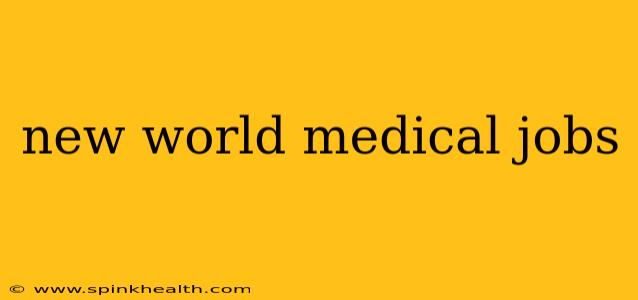The world of medicine is undergoing a breathtaking transformation. Technological advancements, shifting demographics, and evolving healthcare models are creating a surge of exciting and innovative medical jobs. It's not just about doctors and nurses anymore; a whole new ecosystem of roles is emerging, offering diverse career paths for those passionate about improving human health. Let's embark on a journey to explore this dynamic landscape.
What are some of the newest medical jobs?
This isn't a simple question with a simple answer! The "newest" jobs are constantly emerging, but several areas are experiencing explosive growth. Think about the convergence of technology and medicine – that's where many exciting opportunities lie. We're seeing a rise in roles like:
-
AI/ML Specialists in Healthcare: These professionals use artificial intelligence and machine learning to analyze medical data, predict patient outcomes, assist in diagnosis, and personalize treatment plans. It's a field demanding both medical knowledge and sophisticated coding skills.
-
Telehealth Coordinators: The rise of telehealth has created a need for professionals who manage virtual appointments, patient communication, and technical aspects of remote healthcare delivery. Empathy and excellent communication skills are crucial here.
-
Data Scientists in Healthcare: The healthcare industry generates massive amounts of data. Data scientists are vital for extracting meaningful insights from this data, leading to improvements in treatment, research, and public health initiatives. Statistical expertise and data visualization skills are in high demand.
-
Cybersecurity Specialists in Healthcare: Protecting sensitive patient data is paramount. Cybersecurity professionals are essential for securing electronic health records (EHRs) and other vital systems from cyber threats. This role requires a strong understanding of both cybersecurity principles and the healthcare landscape.
-
Robotic Surgery Technicians: As robotic surgery becomes more prevalent, trained technicians are needed to assist surgeons, maintain equipment, and ensure the smooth operation of these complex systems. This is a technically demanding role requiring meticulous attention to detail.
What are the most in-demand medical jobs?
While "newest" and "most in-demand" aren't always interchangeable, there's significant overlap. Many of the jobs mentioned above are currently experiencing high demand. However, some traditional roles remain consistently in high demand, including:
-
Registered Nurses (RNs): The need for skilled RNs remains consistently high across various healthcare settings. This is a cornerstone of the healthcare system and will likely continue to be for years to come.
-
Physician Assistants (PAs): PAs provide valuable support to physicians, performing many tasks under medical supervision. Their versatility and ability to handle a wide range of responsibilities make them highly sought after.
-
Medical Assistants: Medical assistants provide essential administrative and clinical support to physicians and other healthcare professionals, playing a crucial role in the smooth functioning of medical offices and clinics.
-
Physical Therapists: With an aging population, the demand for physical therapists who help patients recover from injuries and illnesses is steadily increasing.
-
Occupational Therapists: These professionals help individuals develop, recover, or improve the skills needed for daily living and working. The demand reflects the need for support for those with disabilities and injuries.
What medical jobs are expected to grow the most in the future?
Looking ahead, the jobs most likely to experience significant growth will be those driven by technology and the evolving healthcare landscape. This includes:
-
Precision Medicine Specialists: As our understanding of personalized medicine advances, professionals skilled in tailoring treatments based on individual genetic makeup and other factors will be highly sought after.
-
Bioinformatics Specialists: Analyzing biological data using computational tools is becoming increasingly important for drug discovery, diagnostics, and personalized medicine.
-
Genetic Counselors: As genetic testing becomes more accessible and affordable, the need for professionals to interpret results and counsel patients will increase significantly.
-
Home Healthcare Workers: With an aging population, the demand for healthcare services delivered at home is expected to continue to rise.
How do I find a new medical job?
Finding a new medical job requires strategic effort. Networking, online job boards (Indeed, LinkedIn, Monster), professional associations, and attending industry conferences are all effective strategies. Tailoring your resume and cover letter to highlight relevant skills and experience for each specific role is critical. Furthermore, consider pursuing certifications and advanced training to enhance your marketability in this competitive field.
The future of medical jobs is bright, innovative, and constantly evolving. By staying informed about the latest trends and developing relevant skills, individuals can embark on rewarding careers in this dynamic and ever-changing field. The journey into this new world of medical jobs promises both challenges and immense opportunities to make a real difference in people's lives.

